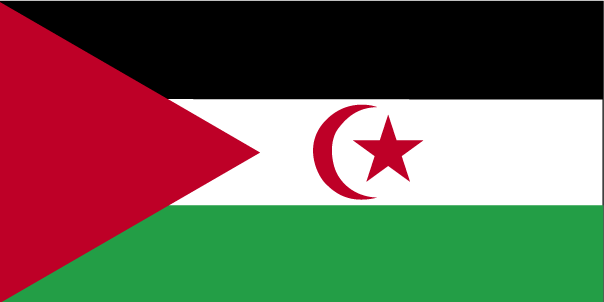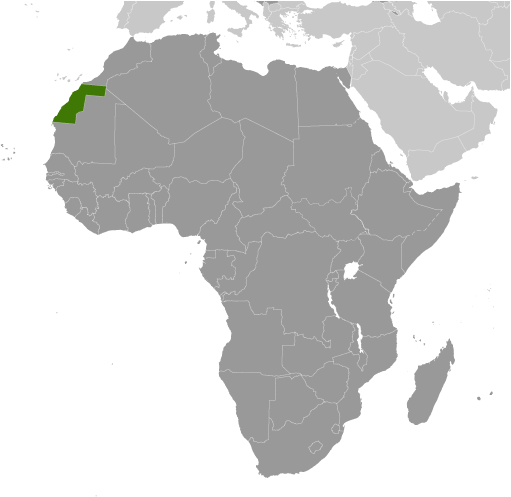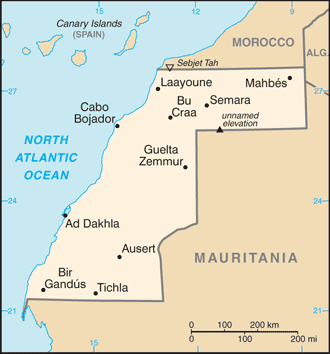



Africa :: WESTERN SAHARA
Introduction :: WESTERN SAHARA
-
Western Sahara is a disputed territory on the northwest coast of Africa bordered by Morocco, Mauritania, and Algeria. After Spain withdrew from its former colony of Spanish Sahara in 1976, Morocco annexed the northern two-thirds of Western Sahara and claimed the rest of the territory in 1979, following Mauritania's withdrawal. A guerrilla war with the Polisario Front contesting Morocco's sovereignty ended in a 1991 cease-fire and the establishment of a UN peacekeeping operation. As part of this effort, the UN sought to offer a choice to the peoples of the Western Sahara between independence (favored by the Polisario Front) or integration into Morocco. A proposed referendum never took place due to lack of agreement on voter eligibility. The 2,700 km- (1,700 mi-) long defensive sand berm, built by the Moroccans from 1980 to 1987 and running the length of the territory, continues to separate the opposing forces with Morocco controlling the roughly 80 percent of the territory west of the berm. Local demonstrations criticizing the Moroccan authorities occur regularly, and there are periodic ethnic tensions between the native Sahrawi population and Moroccan immigrants. Morocco maintains a heavy security presence in the territory.
Geography :: WESTERN SAHARA
-
Northern Africa, bordering the North Atlantic Ocean, between Mauritania and Morocco24 30 N, 13 00 WAfricatotal: 266,000 sq kmland: 266,000 sq kmwater: 0 sq kmcountry comparison to the world: 78about the size of Coloradototal: 2,049 kmborder countries (3): Algeria 41 km, Mauritania 1,564 km, Morocco 444 km1,110 kmcontingent upon resolution of sovereignty issuehot, dry desert; rain is rare; cold offshore air currents produce fog and heavy dewmostly low, flat desert with large areas of rocky or sandy surfaces rising to small mountains in south and northeastlowest point: Sebjet Tah -55 mhighest point: unnamed elevation 805 mphosphates, iron oreagricultural land: 18.8%arable land 0%; permanent crops 0%; permanent pasture 18.8%forest: 2.7%other: 78.5% (2011 est.)NAhot, dry, dust/sand-laden sirocco wind can occur during winter and spring; widespread harmattan haze exists 60% of time, often severely restricting visibilitysparse water and lack of arable landthe waters off the coast are particularly rich fishing areas
People and Society :: WESTERN SAHARA
-
noun: Sahrawi(s), Sahraoui(s)adjective: Sahrawi, Sahrawian, SahraouianArab, BerberStandard Arabic (national), Hassaniya Arabic, Moroccan ArabicMuslim570,866 (July 2013 est.)note: estimate is based on projections by age, sex, fertility, mortality, and migration; fertility and mortality are based on data from neighboring countries (July 2015 est.)country comparison to the world: 1720-14 years: 37.83% (male 109,147/female 106,789)15-24 years: 19.63% (male 56,412/female 55,624)25-54 years: 33.93% (male 95,296/female 98,391)55-64 years: 4.87% (male 12,974/female 14,829)65 years and over: 3.75% (male 9,406/female 11,998) (2015 est.)total dependency ratio: 40.2%youth dependency ratio: 36.1%elderly dependency ratio: 4.1%potential support ratio: 24.4% (2015 est.)total: 20.8 yearsmale: 20.3 yearsfemale: 21.3 years (2014 est.)2.82% (2015 est.)country comparison to the world: 1530.24 births/1,000 population (2015 est.)country comparison to the world: 408.34 deaths/1,000 population (2015 est.)country comparison to the world: 79urban population: 80.9% of total population (2015)rate of urbanization: 3.27% annual rate of change (2010-15 est.)Laayoune 262,000 (2014)at birth: 1.04 male(s)/female0-14 years: 1.02 male(s)/female15-24 years: 1.01 male(s)/female25-54 years: 0.97 male(s)/female55-64 years: 0.87 male(s)/female65 years and over: 0.78 male(s)/femaletotal population: 0.99 male(s)/female (2015 est.)total: 54.7 deaths/1,000 live birthsmale: 59.61 deaths/1,000 live birthsfemale: 49.6 deaths/1,000 live births (2015 est.)country comparison to the world: 27total population: 62.64 yearsmale: 60.35 yearsfemale: 65.02 years (2015 est.)country comparison to the world: 1904 children born/woman (2015 est.)country comparison to the world: 38NANANA
Government :: WESTERN SAHARA
-
conventional long form: noneconventional short form: Western Saharaformer: Rio de Oro, Saguia el Hamra, Spanish Saharalegal status of territory and issue of sovereignty unresolved; territory contested by Morocco and Polisario Front (Popular Front for the Liberation of the Saguia el Hamra and Rio de Oro), which in February 1976 formally proclaimed a government-in-exile, the Sahrawi Arab Democratic Republic (SADR), based out of refugee camps near Tindouf, Algeria, led by President Mohamed ABDELAZIZLaayoune (administrative center)time difference: UTC 0 (5 hours ahead of Washington, DC, during Standard Time)daylight saving time: +1hr, begins last Sunday in April; ends last Sunday in Septembernone officially, the territory west of the Moroccan berm falls under de facto Moroccan control; Morocco claims the territory of Western Sahara, the political status of which is considered undetermined by the US Government; portions of the regions Guelmim-Es Smara and Laayoune-Boujdour-Sakia El Hamra as claimed by Morocco lie within Western Sahara; Morocco also claims Oued Eddahab-Lagouira, another region that falls entirely within Western Saharanone; (residents of Moroccan-controlled Western Sahara participate in Moroccan elections)nonenoneAU, CAN (observer), WFTU (NGOs)nonenone
Economy :: WESTERN SAHARA
-
Western Sahara has a small market-based economy whose main industries are fishing, phosphate mining, and pastoral nomadism. The territory's arid desert climate makes sedentary agriculture difficult, and Western Sahara imports much of its food. The Moroccan Government administers Western Sahara's economy and is a key source of employment, infrastructure development, and social spending in the territory. Western Sahara's unresolved legal status makes the exploitation of its natural resources a contentious issue between Morocco and the Polisario. Morocco and the EU in December 2013 finalized a four-year agreement allowing European vessels to fish off the coast of Morocco, including disputed waters off the coast of Western Sahara. Oil has never been found in Western Sahara in commercially significant quantities, but Morocco and the Polisario have quarreled over who has the right to authorize and benefit from oil exploration in the territory. Western Sahara's main long-term economic challenge is the development of a more diverse set of industries capable of providing greater employment and income to the territory.$906.5 million (2007 est.)country comparison to the world: 205$NANA%$2,500 (2007 est.)country comparison to the world: 196agriculture: NA%industry: NA%services: 40% (2007 est.)fruits and vegetables (grown in the few oases); camels, sheep, goats (kept by nomads); fishphosphate mining, handicraftsNA%144,000 (2010 est.)country comparison to the world: 178agriculture: 50%industry and services: 50% (2005 est.)NA%NA%lowest 10%: NA%highest 10%: NA%revenues: $NAexpenditures: $NANA%NA%calendar yearNA%$NAphosphates 62% (2012 est.)$NAfuel for fishing fleet, foodstuffs$NAMoroccan dirhams (MAD) per US dollar -8.24 (2014)8.3803 (2013)8.6 (2012)8.0899 (2011)8.4172 (2010)
Energy :: WESTERN SAHARA
-
90 million kWh (2011 est.)country comparison to the world: 20283.7 million kWh (2011 est.)country comparison to the world: 2010 kWh (2013 est.)country comparison to the world: 2140 kWh (2013 est.)country comparison to the world: 21658,000 kW (2011 est.)country comparison to the world: 184100% of total installed capacity (2011 est.)country comparison to the world: 410% of total installed capacity (2011 est.)country comparison to the world: 2060% of total installed capacity (2011 est.)country comparison to the world: 2100% of total installed capacity (2011 est.)country comparison to the world: 1420 bbl/day (2013 est.)country comparison to the world: 1440 bbl/day (2010 est.)country comparison to the world: 2060 bbl/day (2010 est.)country comparison to the world: 1430 bbl (1 January 2014 est.)country comparison to the world: 2080 bbl/day (2010 est.)country comparison to the world: 2092,040 bbl/day (2013 est.)country comparison to the world: 1890 bbl/day (2010 est.)country comparison to the world: 1441,702 bbl/day (2010 est.)country comparison to the world: 1840 cu m (2012 est.)country comparison to the world: 2090 cu m (2012 est.)country comparison to the world: 2090 cu m (2012 est.)country comparison to the world: 2080 cu m (2012 est.)country comparison to the world: 790 cu m (1 January 2014 est.)country comparison to the world: 208316,100 Mt (2012 est.)country comparison to the world: 190
Communications :: WESTERN SAHARA
-
general assessment: sparse and limited systemdomestic: NAinternational: country code - 212; tied into Morocco's system by microwave radio relay, tropospheric scatter, and satellite; satellite earth stations - 2 Intelsat (Atlantic Ocean) linked to Rabat, Morocco (2008)Morocco's state-owned broadcaster, Radio-Television Marocaine (RTM), operates a radio service from Laayoune and relays TV service; a Polisario-backed radio station also broadcasts (2008)AM 2, FM 0, shortwave 0 (1998)NA.eh
Transportation :: WESTERN SAHARA
-
6 (2013)country comparison to the world: 174total: 32,438 to 3,047 m: 3 (2013)total: 31,524 to 2,437 m: 1914 to 1,523 m: 1under 914 m:1 (2013)major seaport(s): Ad Dakhla, Laayoune (El Aaiun)
Military :: WESTERN SAHARA
-
males age 16-49: 79,489females age 16-49: 87,362 (2010 est.)male: 5,523female: 5,429 (2010 est.)
Transnational Issues :: WESTERN SAHARA
-
many neighboring states reject Moroccan administration of Western Sahara; several states have extended diplomatic relations to the "Sahrawi Arab Democratic Republic" represented by the Polisario Front in exile in Algeria, while others recognize Moroccan sovereignty over Western Sahara; approximately 90,000 Sahrawi refugees continue to be sheltered in camps in Tindouf, Algeria, which has hosted Sahrawi refugees since the 1980s
